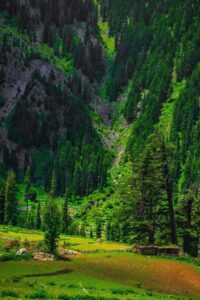Introduction
Ecotourism plays a crucial role in supporting local communities by providing economic, environmental, and social benefits. So, in this post, we are exploring what are the benefits of ecotourism to the local community? By focusing on sustainable practices, ecotourism creates job opportunities, boosts local economies, and encourages cultural preservation. It also helps protect natural environments, ensuring they remain intact for future generations. In addition, it fosters a deeper connection between tourists and local communities. We’ll dive into how ecotourism is making a positive impact in countries like Pakistan. This type of tourism not only benefits the environment but also empowers local people to take pride in their culture and surroundings. Let’s explore these important benefits in more detail.
Table of Contents
Understanding Ecotourism
As more people around the world become aware of the environmental impact of their choices, a new form of travel is rising in popularity—ecotourism. But what exactly does this term mean, and why is it important, especially for countries like Pakistan that are rich in natural beauty and cultural diversity?

What is Ecotourism?
Ecotourism is a type of tourism that focuses on responsible travel to natural areas. It aims to conserve the environment, respect local cultures, and improve the well-being of local communities. Unlike mass tourism, which often harms ecosystems and displaces local people, ecotourism is built on sustainability and mutual benefit. Think of it this way: if regular tourism is about ticking destinations off a list, ecotourism is about connecting with a place—its land, its people, and its traditions—while leaving a positive impact behind.
Core Principles of Ecotourism
For travel to truly qualify as “eco,” it must follow some key principles. These are recognized by international ecotourism organizations and can guide both travelers and businesses in making better choices.
Here are the main pillars:
- Minimize environmental impact: This includes reducing pollution, preserving wildlife habitats, and avoiding overuse of natural resources.
- Build environmental and cultural awareness: Educating travelers about local ecosystems and traditions helps foster respect and protection.
- Provide direct financial benefits to local people: Ecotourism supports the local economy by creating jobs and funding community projects.
- Promote cultural respect: Travelers engage with local communities in a way that honors their customs, beliefs, and lifestyles.
- Offer meaningful experiences: Ecotourism isn’t just sightseeing—it’s about learning, participating, and forming real connections with the place and its people.
Why Ecotourism Matters in Pakistan
Pakistan is home to diverse landscapes, from the majestic mountains of the north to lush forests, deserts, and coastal areas. It’s also rich in cultural heritage, with dozens of ethnic communities and centuries-old traditions.
Unfortunately, some of these treasures are at risk due to climate change, over-tourism, and lack of infrastructure. Ecotourism offers a solution that not only protects these resources but also helps local communities grow in a sustainable way.
In places like Hunza, Skardu, Swat, and Kalash, eco-conscious travel is already making a difference. By choosing to support ecotourism, travelers contribute to a long-term vision where people, nature, and culture thrive together.

Economic Benefits of Ecotourism to Local Communities
One of the most tangible and immediate impacts of ecotourism is its ability to boost the local economy—especially in rural or underdeveloped areas where job opportunities are limited. When tourism is done responsibly, it creates a ripple effect that improves the livelihoods of individuals, families, and entire communities.
Let’s explore how ecotourism brings real economic value to the people living in the destinations we visit.
Job Creation and Livelihood Opportunities
Ecotourism creates sustainable jobs that often require minimal formal education but provide stable income. These jobs range from local guides, homestay hosts, and drivers, to chefs, artists, and artisans.
Real-Life Examples in Pakistan
In regions like Hunza Valley, Chitral, and Swat, many locals now earn a living through tourism-related work:
- Families run guesthouses and eco-lodges, often built in traditional architectural styles.
- Youth are trained as tour guides who offer insights into local history, wildlife, and hiking trails.
- Women produce and sell handmade crafts, such as woolen shawls, jewelry, and organic skincare products.
These income streams allow locals to stay in their communities instead of migrating to urban centers for work.
Support for Local Businesses and Services
When ecotourists visit a region, they spend money locally, which helps small businesses grow. This includes:
- Restaurants serving local dishes like chapshuro, dam pukht, or trout from the Gilgit-Baltistan region.
- Transport services like jeep drivers, porters, or boat operators.
- Souvenir shops selling locally sourced and eco-friendly items.
This localized spending helps build a more resilient and self-sufficient economy that doesn’t rely on foreign investors or outside companies.
Encouragement of Sustainable Agriculture and Craftsmanship
Ecotourism increases demand for local, natural, and handmade products, encouraging farmers and artisans to keep their traditional practices alive.
Example – Organic Farming in Gilgit-Baltistan
Some eco-lodges and guesthouses now serve meals made from organic, locally grown produce. This not only improves health outcomes but also boosts local agriculture.
In addition, traditional handicrafts—like embroidery, basket weaving, and wood carving—are being revived because tourists are willing to pay for authentic, handmade products.
Boosting Infrastructure and Community Development
Tourism revenue often contributes to the development of infrastructure, such as:
- Roads and trails that connect villages
- Waste management systems
- Community centers
- Renewable energy solutions like micro-hydel projects or solar lights
Some community-based tourism initiatives even allocate a portion of their profits to education and healthcare, which creates long-term value for everyone—not just those directly involved in tourism.
Encouraging Local Entrepreneurship
Ecotourism inspires many locals—especially youth and women—to start their own businesses, such as:
- Eco-tour companies offering hiking, cultural tours, or wildlife safaris
- Artisan collectives
- Cooking classes and food tours
- Online stores for handmade products
By building their own ventures, locals take ownership of their economic future and create unique, authentic experiences for travelers.
Environmental Benefits for the Community
While ecotourism is often viewed through the lens of economy and culture, one of its most powerful impacts is on the environment—and, by extension, the communities that depend on it. Healthy ecosystems are the backbone of rural life in many parts of Pakistan, especially in regions where agriculture, clean water, and natural beauty are tied directly to survival and livelihood.
Let’s explore how ecotourism helps protect the environment while empowering local communities to become guardians of their own natural heritage.
Conservation of Natural Resources
One of the biggest environmental benefits of ecotourism is its ability to incentivize conservation. When local communities see financial benefits from preserving forests, rivers, and wildlife, they are more likely to take steps to protect them.
Example – Wildlife Protection in Gilgit-Baltistan
In the northern regions of Pakistan, particularly in Gilgit-Baltistan, community-based wildlife conservation projects have helped increase the population of rare species like the snow leopard, Marco Polo sheep, and Himalayan ibex.

Local communities now manage these conservation areas, with part of the income from trekking permits and guided tours going directly back into wildlife protection and community development.
Reducing the Need for Environmentally Harmful Practices
Ecotourism provides an alternative source of income, which reduces dependence on activities that harm the environment, such as:
- Illegal logging
- Overgrazing
- Poaching
- Unregulated mining
Instead of cutting down forests for firewood or selling wildlife products, people can earn a living by preserving the very things that make their land unique and valuable to tourists.
Education and Environmental Awareness
Another key benefit of ecotourism is that it often comes with an educational component, both for tourists and locals.
- Visitors learn about local ecosystems, endangered species, and sustainable practices.
- Locals, especially children and youth, gain a deeper appreciation for their natural heritage and are more likely to protect it for future generations.
In many areas of Pakistan, environmental education was once limited—but ecotourism is helping to fill that gap through eco-clubs, nature walks, and interpretive centers.
Promoting Low-Impact Travel
Unlike mass tourism, which often involves luxury hotels, heavy vehicle traffic, and overuse of natural resources, ecotourism promotes low-impact activities such as:
- Hiking and trekking
- Birdwatching
- Cultural tours
- River rafting with local guides
These activities are not only better for the environment, but they also offer travelers a more immersive and authentic experience.
Improved Waste Management and Clean Energy Initiatives
With the rise of eco-lodges and green guesthouses, many communities are beginning to adopt:
- Waste reduction strategies (like banning plastic bottles and using composting toilets)
- Recycling programs
- Clean energy sources, such as solar panels and micro-hydroelectric systems
These changes not only reduce the ecological footprint of tourism but also improve quality of life for locals, especially in remote areas where government services are limited.
Spotlight – Eco-Lodges in Skardu
Some eco-lodges in Skardu and Hopper Valley use solar energy, harvest rainwater, and manage waste responsibly. These efforts set a sustainable example that inspires both guests and neighboring households to follow suit.

Supporting Biodiversity and Natural Habitats
By preserving forests, meadows, rivers, and mountain regions, ecotourism helps protect biodiversity. This includes not only iconic wildlife but also important plant species, pollinators, and water resources that are vital for agriculture and daily life.
The healthier the environment, the more sustainable the local lifestyle becomes.
Social and Cultural Benefits
Ecotourism isn’t just about nature—it’s also deeply connected to people and their ways of life. One of the most rewarding aspects of sustainable travel is its ability to preserve culture, strengthen communities, and empower individuals, especially in rural and remote areas.
When done respectfully and responsibly, ecotourism can create deep social value by helping local communities retain their identity, share their heritage, and grow stronger together.
Let’s explore the major social and cultural benefits of ecotourism for local communities.
Preservation of Cultural Heritage
Traditional customs, languages, music, and rituals are often at risk of fading due to globalization and modernization. But when tourists come specifically to experience these unique aspects of a culture, it creates a powerful incentive to keep those traditions alive.
Example – Kalash Valley
The Kalash people in northern Pakistan are one of the most culturally distinct groups in the country. Their unique festivals, colorful dresses, wooden temples, and language attract curious travelers from around the world.
Ecotourism in Kalash not only supports the community financially but also helps in preserving their way of life, as the income earned can be used for education, cultural documentation, and restoration of heritage sites.
Empowerment of Women and Youth
In many traditional communities, especially in rural Pakistan, women and young people have fewer economic opportunities. Ecotourism is helping shift that dynamic.
- Women are running homestays, cooking traditional meals for tourists, and selling handicrafts directly to visitors.
- Youth are becoming eco-guides, learning digital marketing to promote their region, and engaging in environmental conservation efforts.
This fosters a sense of independence, confidence, and community involvement—all while building a new generation of cultural ambassadors.
Real Impact – Women in Hunza
In places like Hunza, women-led enterprises such as handicraft collectives and eco cafes are gaining popularity. Some organizations even provide training in entrepreneurship, guiding, and hospitality to women, allowing them to contribute significantly to the local economy.
Strengthening of Community Pride and Identity
When travelers show genuine interest and admiration for a local community’s culture and traditions, it naturally boosts community morale and pride. People begin to see their language, history, and customs not as outdated, but as something special and worth sharing.
- Storytelling becomes a tool for cultural preservation.
- Music, dance, and art regain popularity among the youth.
- Historic sites are restored or protected because they draw respectful attention.
This revitalization strengthens intergenerational bonds, where elders teach traditions to younger family members to prepare them for tourism opportunities.
Encouragement of Cross-Cultural Understanding
Ecotourism creates an environment for meaningful interaction between locals and visitors. This isn’t about staged performances or artificial tourist experiences—it’s about real conversations, shared meals, and authentic connections.
For example:
- A tourist may learn to make Chapshuro (a traditional Hunza meat pie) with a local family.
- A Kalash host might explain the stories behind their unique rituals.
- A guide in Swat could share oral histories passed down through generations.
These exchanges foster mutual respect, challenge stereotypes, and create a deeper appreciation for both hosts and guests.
Support for Community-Based Initiatives
Many ecotourism projects in Pakistan are community-led, meaning the people in the area are involved in every step—from planning and decision-making to managing and benefiting from the business.
This builds trust, unity, and shared responsibility, all of which are vital for long-term success and sustainability.
Example – Community Tourism in Skardu
In Skardu, some eco-tourism programs are organized entirely by local communities, with profits going into:
- Education funds
- Women’s skill development centers
- Conservation projects
- Cultural preservation campaigns
These grassroots models empower communities to grow on their own terms, rather than depending on outside investors or government aid.
Challenges of Ecotourism (And How to Overcome Them)
While ecotourism offers many benefits—economic, environmental, social, and cultural—it’s not without its challenges. When not planned and managed properly, ecotourism can unintentionally harm the very communities and environments it aims to protect.
Understanding these challenges is key to making ecotourism truly sustainable. The good news? Most of these issues can be addressed with thoughtful strategies, local involvement, and responsible behavior from both tourists and tour operators.
Let’s explore some of the most common challenges—and how we can overcome them.
Risk of Over-Tourism
Even in small, remote communities, an unexpected surge in tourists can put a strain on natural resources, infrastructure, and local life.
Too many visitors at once can lead to:
- Pollution and littering
- Water shortages
- Increased traffic and noise
- Damage to trails or cultural sites
Solution – Manage Visitor Numbers
Communities and tour operators should set visitor limits based on the carrying capacity of each site. This can include:
- Requiring advance booking for popular trails or guesthouses
- Rotating tourist routes to less-visited areas
- Creating seasonal tourism plans to reduce pressure during peak months
In Gilgit-Baltistan, some valleys now limit camping sites and trekking groups to reduce environmental stress—a great example of crowd management.
Cultural Exploitation or Misrepresentation
When culture is “packaged” only to entertain tourists, it can become superficial or distorted, leading to loss of authenticity.
In some cases, traditions may be altered or exaggerated to suit tourist expectations, or sacred ceremonies may be commercialized, which can offend locals and damage cultural integrity.
Solution – Community-Led Experiences
The best way to protect cultural heritage is to put locals in charge of telling their own stories.
- Encourage tourism activities that are designed and led by the community, not outsiders.
- Ensure travelers receive proper cultural orientation, including what is and isn’t appropriate to photograph or participate in.
- Promote genuine interactions over staged performances.
For example, Kalash guides often offer cultural tours that include personal stories and real participation in daily life, rather than scripted shows.
Environmental Degradation
Ironically, even well-meaning tourists can harm the environment they came to appreciate.
Common problems include:
- Litter on hiking trails or campsites
- Off-road driving that damages meadows
- Campfires causing deforestation or wildfires
- Overuse of natural water sources
Solution – Educate and Enforce Eco-Rules
Tourists need clear guidelines—and they need to be followed up with action.
- Leave No Trace principles should be a standard part of every tour briefing.
- Eco-lodges and guides can provide reusable items like water bottles or eco soap.
- Designated trails, campsites, and waste disposal stations help minimize impact.
Some Pakistani eco-tour companies now include waste-collection kits in their tour packages and reward travelers who bring back trash from hiking trails. It’s a simple but powerful way to spread awareness.
Lack of Local Involvement
When tourism is developed without consulting the local population, it can lead to:
- Unfair profit distribution
- Resentment toward tourists
- Loss of cultural control
This often happens when big tourism companies dominate the scene, sidelining local voices and benefiting only a few.
Solution – Support Community-Based Tourism
Community-based ecotourism ensures that local people are involved in planning, decision-making, and profit-sharing. It also keeps tourism aligned with the community’s values and long-term goals.
Governments, NGOs, and travel platforms should focus on:
- Training local guides and entrepreneurs
- Supporting locally owned lodges and businesses
- Promoting co-ops and cultural centers
In Skardu and Swat, several such initiatives are already running successfully—where community councils decide how to distribute tourism income.
Greenwashing by Tour Operators
Some businesses market themselves as “eco-friendly” without actually practicing sustainability. This is known as greenwashing, and it misleads tourists who want to travel responsibly.
Examples include:
- Using plastic bottles while claiming to be “zero-waste”
- Operating large vehicles and claiming to run “eco-tours”
- Building resorts in protected areas without permits
Solution – Look for Verified and Transparent Operators
Travelers can avoid greenwashing by doing some research:
- Look for certifications from organizations like Global Sustainable Tourism Council (GSTC)
- Check if the business is locally owned or supports community projects
- Read reviews and ask direct questions about their environmental practices
Affiliate platforms and blogs (like yours!) can also help by recommending genuinely sustainable options, rather than those who just use “eco” as a marketing buzzword.
How Tourists Can Support Local Communities Through Ecotourism
As travelers, we have the power to make a significant difference in the places we visit—especially when we choose to travel responsibly. Ecotourism isn’t just about exploring beautiful landscapes; it’s about supporting the people who call those places home. By making mindful decisions, tourists can help boost local economies, preserve cultural heritage, and ensure that the environment remains protected for future generations.
1. Choose Local, Eco-Friendly Accommodations
One of the most impactful ways tourists can contribute is by choosing to stay at locally owned and eco-friendly accommodations. Whether it’s a family-run guesthouse in Hunza, an eco-lodge in Skardu, or a homestay in Kalash Valley, these types of accommodations directly benefit local families and contribute to sustainable practices.
Why It Matters
- Local ownership means that more of the money spent by travelers stays within the community.
- Eco-friendly accommodations often focus on energy conservation, waste reduction, and using local materials—making them much more sustainable than large, international hotel chains.
- By staying in such places, you’re also encouraging others to adopt environmentally responsible practices.
2. Support Local Artisans and Markets
When you buy local crafts, souvenirs, or food products, you’re directly supporting artisans, farmers, and small business owners. Handmade goods such as jewelry, woven textiles, or pottery are not only unique, but they also provide vital income for local families.

Why It Matters
- Purchasing from local markets helps avoid mass-produced, unsustainable items that harm the environment.
- Many artisanal products are made using traditional, eco-friendly methods, supporting cultural preservation.
- The money spent on local crafts and produce helps the community maintain its customs and livelihoods, often empowering women and youth in the process.
For example, in Hunza and Swat, buying locally made woolen shawls or embroidered textiles helps keep traditional skills alive while supporting families who rely on these crafts.
3. Engage in Responsible Wildlife Viewing
Ecotourism often includes wildlife safaris, birdwatching tours, and nature hikes, allowing travelers to connect with local ecosystems and species. However, it’s crucial to approach these activities responsibly. This means choosing ethical wildlife tours that minimize human impact on animals and habitats.
Why It Matters
- By participating in responsible wildlife viewing, you contribute to the conservation of local species—whether it’s the snow leopard in Gilgit-Baltistan or the Markhor in the Himalayas.
- Supporting conservation-based tourism ensures that profits go toward protecting endangered species, and it provides economic incentives for locals to protect wildlife rather than harm it.
- Ethical wildlife tours help educate visitors about the importance of biodiversity and encourage a deeper understanding of nature conservation.
In Pakistan, travelers can visit wildlife sanctuaries and nature reserves, where local guides teach visitors about endangered species, their habitats, and the community-led conservation efforts in place.
4. Respect Local Cultures and Traditions
Ecotourism gives tourists the opportunity to interact with diverse communities, including indigenous groups and rural populations. However, respectful interaction is essential to ensure that local cultures are not exploited or disrespected.
Why It Matters
- Cultural respect strengthens the relationship between locals and tourists, fostering mutual understanding and appreciation.
- By learning about and honoring local traditions, you can avoid inadvertently causing offense or contributing to the misrepresentation of cultures.
- Ethical cultural tourism helps ensure that communities retain control over their cultural narratives and that their traditions are passed down authentically.
In Kalash Valley, for instance, it’s important for tourists to understand local customs, such as the significance of the valley’s annual festivals or the spiritual importance of their sacred sites. By respecting these traditions, visitors help preserve the authenticity of the Kalash people’s way of life.
5. Participate in Community-Based Tours
Many ecotourism projects are designed to benefit both travelers and locals through community-led tours. By booking these tours, tourists contribute directly to the well-being of local communities. Whether it’s a guided nature walk, a cultural heritage tour, or a farm visit, these experiences are often led by local guides who are experts in their region’s history, ecology, and culture.
Why It Matters
- Community-based tours ensure that local guides and small businesses benefit financially, rather than large tour companies or external operators.
- These tours are often designed to highlight the sustainable practices of the community, creating a stronger bond between travelers and locals.
- Tourists gain a more authentic, insightful experience, and they directly contribute to the community’s economic development and cultural preservation.
For example, in Swat Valley, travelers can engage in community-led trekking tours that introduce them to the valley’s natural beauty and cultural history, while also helping local communities support themselves.
6. Minimize Environmental Impact During Your Travels
As a tourist, you can do your part to minimize your carbon footprint and reduce waste during your trip. From minimizing plastic use to choosing sustainable transportation options, these actions help ensure that the destinations you visit remain intact for future travelers.
Why It Matters
- Reducing waste and pollution means less pressure on local ecosystems and fewer resources needed to clean up after tourists.
- Choosing sustainable transportation (e.g., walking, cycling, or eco-friendly vehicles) reduces the environmental impact of tourism.
- Conserving water and reducing plastic use supports the community’s efforts to maintain a healthy environment.
Many eco-lodges and tour operators in Pakistan offer eco-friendly options, such as reusable water bottles, biodegradable products, and low-carbon tours, which help ensure that tourism is not damaging the natural beauty that draws people to these regions.
Ecotourism in Pakistan – A Growing Opportunity
Pakistan, with its rich history, diverse landscapes, and unique cultures, is quickly becoming an emerging ecotourism destination. From the towering peaks of the Himalayas and Karakoram to the lush valleys of Swat and Hunza, and the serene coastal areas of Makran, the country offers a wide array of natural wonders that attract travelers seeking to immerse themselves in untouched landscapes and authentic cultural experiences.
As awareness of the environmental and cultural benefits of ecotourism grows, Pakistan’s ecotourism sector is witnessing rapid development. This presents not only a chance for economic growth and environmental conservation but also for communities to benefit from a sustainable form of tourism that can offer long-term advantages.
Let’s explore why ecotourism in Pakistan is a growing opportunity and how it is shaping the future of travel in the country.
1. Diverse Natural Beauty: A Treasure for Ecotourism
Pakistan is blessed with one of the most diverse and breathtaking natural environments in the world. The country’s landscapes are as varied as its geography, from snow-capped mountains and deep valleys to deserts, forests, and rivers. With a total of five mountain ranges, including the famous Karakoram, Himalayas, and Hindu Kush, Pakistan offers world-class trekking and mountaineering opportunities.
Popular destinations like Hunza, Skardu, and Naltar are already well-known for their trekking trails, serene lakes, and pristine landscapes. These areas not only attract nature lovers and adventure seekers but also have potential to become even more prominent ecotourism hotspots.
Why This Is an Opportunity
- Pakistan’s natural beauty is largely untapped and underexplored, offering a unique opportunity for ecotourism growth.
- As global travelers become increasingly environmentally conscious, Pakistan is perfectly positioned to offer sustainable and off-the-beaten-path travel experiences.
- By focusing on responsible tourism, local communities can benefit from the preservation of these natural areas.
2. Cultural Heritage and Community Involvement
In addition to its natural wonders, Pakistan’s cultural diversity is one of its most significant assets. With over 70 ethnic groups and a variety of languages, customs, and traditions, the country offers rich cultural experiences. Ecotourism in Pakistan emphasizes community-based tourism, where locals are directly involved in the tourism experience.
Regions like Kalash Valley in Chitral or Mingora in Swat are prime examples where tourism has the potential to strengthen and celebrate local cultures. These communities are often involved in guiding tours, offering authentic cultural experiences, and showcasing traditional art, crafts, and cuisines.
Why This Is an Opportunity
- Cultural tourism allows visitors to experience authentic local traditions, while also providing an income for communities who can share their stories and heritage.
- By supporting community-led tourism initiatives, travelers can contribute to the preservation of culture and promote intercultural exchange.
- Empowering local communities helps reduce poverty and promotes sustainable economic development.
3. Government and Private Sector Support for Ecotourism
In recent years, the Pakistani government has shown an increasing interest in the development of sustainable tourism. The National Tourism Strategy has set ambitious goals for boosting tourism and improving infrastructure, with a strong focus on eco-friendly travel and responsible tourism practices.
Moreover, the private sector is also taking steps to embrace ecotourism, with more travel agencies offering eco-friendly tours and green accommodations. From building eco-lodges to organizing low-impact treks and wildlife safaris, the private sector is actively contributing to the growth of the ecotourism industry.
Why This Is an Opportunity
- Government support and investment in tourism infrastructure create a strong foundation for sustainable tourism development.
- A growing focus on eco-friendly practices will not only help attract environmentally conscious travelers but also reduce the ecological footprint of tourism activities.
- Private sector involvement in eco-tourism provides an opportunity for job creation and supports the local economy.
4. Wildlife Conservation and Ecotourism
Pakistan is home to a diverse range of wildlife species, many of which are found nowhere else in the world. Species such as the snow leopard, markhor, Himalayan brown bear, and Indus dolphin are critically endangered, but ecotourism offers a pathway to their conservation.
By promoting responsible wildlife viewing and supporting protected areas like the Khunjerab National Park or Deosai National Park, tourists can contribute to the conservation of these species while learning about the efforts to protect them.
Why This Is an Opportunity
- Ecotourism is a powerful tool for raising awareness about endangered species and their habitats.
- Tourism revenue can be reinvested into conservation efforts, helping protect vulnerable species and their ecosystems.
- Wildlife-related tourism creates job opportunities in conservation, guiding, and eco-tourism management, benefiting local communities and the environment.
5. Potential for Sustainable Economic Growth
The growing interest in ecotourism presents a unique opportunity for Pakistan’s economy. By promoting sustainable travel experiences and fostering eco-friendly practices, the country can attract travelers who are willing to pay a premium for authentic, responsible experiences.
For communities in remote and underserved areas, ecotourism provides an avenue for economic growth without the destructive consequences of mass tourism. The money spent by eco-conscious travelers can help build better infrastructure, support local businesses, and create opportunities for youth education and employment in eco-tourism and conservation fields.
Why This Is an Opportunity
With increasing demand for responsible travel, Pakistan has the potential to position itself as a leading ecotourism destination in Asia.
Sustainable tourism can stimulate local economies, create jobs, and build local infrastructure, without harming the environment.
Community-based tourism ensures that the benefits of tourism reach the people who need it most, especially in rural and underdeveloped areas.
Conclusion: Embracing the Power of Ecotourism for a Sustainable Future
In conclusion, ecotourism in Pakistan presents an incredible opportunity not only for sustainable economic growth but also for the preservation of its rich cultural heritage and breathtaking landscapes. As travelers, we hold the key to shaping the future of tourism in the country, making responsible travel choices that benefit both the environment and the local communities.
By embracing eco-friendly accommodations, supporting local artisans, and engaging in wildlife conservation efforts, we can play a direct role in the development of ecotourism in Pakistan. This movement towards sustainable tourism allows us to connect with nature in a meaningful way while ensuring that future generations can enjoy the same pristine beauty and cultural richness that we experience today.
For Pakistan, ecotourism isn’t just a trend; it’s a growing industry with the potential to transform both the economy and the environment. As more travelers seek authentic, low-impact experiences, the opportunity for local communities to thrive through responsible tourism becomes even greater.
FAQ
Question1. What’s the difference between ecotourism and regular tourism?
Answer. Ecotourism focuses on sustainability, conservation, and supporting local communities, while regular tourism can harm the environment and culture.
Question2. How can I support local communities in Pakistan?
Answer. Choose eco-friendly stays, hire local guides, and buy handmade crafts directly from artisans to help sustain local economies.
Question3. Why is Pakistan a growing ecotourism destination?
Answer. Pakistan offers pristine landscapes, cultural diversity, and is increasingly focused on sustainable tourism, making it ideal for eco-conscious travelers.




